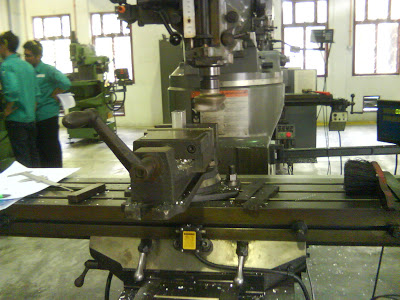Bachelor of Manufacturing Engineering (Honours)
Undergraduate
| 1. | Program/MQR No. |
| Bachelor of Engineering (Manufacturing) (Honours) | |
2. |
Brief introduction |
| Graduates from Manufacturing Engineering programme are expected to acquire a comprehensive understanding and skill on the behavior and properties of materials as they are altered and influenced by processing in manufacturing. Among other courses the students specifically learn include Instrumentation and Control, Vibration and Mechanic of Machines, Design of Machine Components, Quality Control, Computer Aided & Manufacturing (CAD/CAM), Metrology and Measurement System, Production Tooling, Manufacturing Automation, Machine Tools, Computer Integrated Manufacturing (CIM), Product Design and Development, Production Planning and Control (PPC). |
|
3. |
Program Outcome |
|
Students graduated from the Kulliyyah of Engineering programmes should have the ability to: 1. Engineering Knowledge (T) - Apply knowledge of mathematics, sciences, engineering fundamentals and an engineering specialization to the solution of complex engineering problems; 2. Problem Analysis (T) – Identify, formulate, research relevant literature and analyze complex engineering problems, and reaching substantiated conclusions using first principles of mathematics, natural sciences and engineering sciences; 3. Design/Development of Solutions (A) – Design solutions, exhibiting innovativeness, for complex engineering problems and design systems, components or processes that meet specified needs with appropriate consideration for public health and safety, cultural, societal, economical, ethical, environmental and sustainability issues; 4. Investigation (D) - Conduct investigation into complex problems, displaying creativeness, using research-based knowledge, and research methods including design of experiments, analysis and interpretation of data, and synthesis of information to provide valid conclusions; 5. Modern Tool Usage (A & D) - Create, select and apply appropriate techniques, resources, and modern engineering and IT tools, including prediction and modelling, to complex engineering activities, with an understanding of the limitations; 6. The Engineer and Society (ESSE) - Apply reasoning informed by contextual knowledge to assess societal, health, safety, legal and cultural issues and the consequent responsibilities relevant to professional engineering practice and solutions to complex engineering problems; 7. Environment and Sustainability (ESSE) - Understand and evaluate the sustainability and impact of professional engineering work in the solutions of complex engineering problems in societal and environmental contexts; 8. Ethics (ESSE) – Apply professional ethics with Islamic values and commit to responsibilities and norms of professional engineering code of practices; 9. Communication (S) - Communicate effectively on complex engineering activities with the engineering community and with society at large, such as being able to comprehend and write effective reports and design documentation, make effective presentations, and give and receive clear instructions; 10. Individual and Team Work (S) - Function effectively as an individual, and as a member or leader in diverse teams and in multi-disciplinary settings; 11. Life Long Learning (S) - Recognize the need for, and have the preparation and ability to engage in independent and life-long learning in the broadest context of technological change 12. Project Management and Finance (S) - Demonstrate knowledge and understanding of engineering management and financial principles and apply these to one’s own work, as a member and/or leader in a team, to manage projects in multidisciplinary settings, and identify opportunities of entrepreneurship. |
|
4. |
Career Opportunities |
| Over the years, the Manufacturing Engineering programme have produced a diverse range of graduates, serving the industry, amongst others, as designers, engineers, technologists and specialists in failure analysis, quality control, semiconductor fabrication, and various other research and development (R&D) scopes. The alumni of the Manufacturing Engineering program are employed by a wide-range of companies within the industry, for examples;
| |
5. |
Program Structure |
| Course Structure Flowchart | |
6. |
Duration of Study |
| The course takes four years of full-time study to complete |
Student Affair








